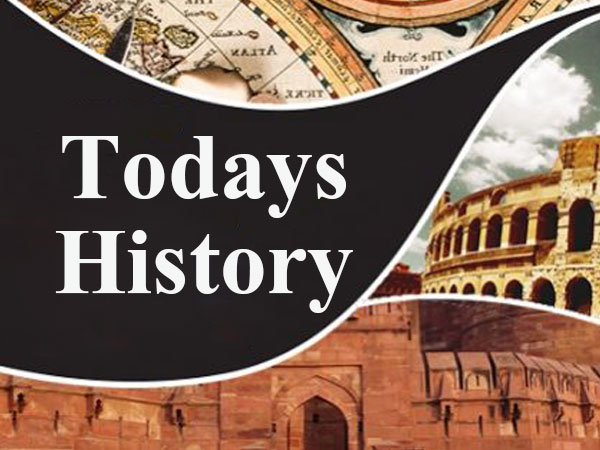History of 2 February
- 1536 – Spaniard Pedro de Mendoza founds Buenos Aires, Argentina.
- 1645 – Battle of Inverlochy.
- 1653 – New Amsterdam (later renamed The City of New York) is incorporated.
- 1709 – Alexander Selkirk is rescued after being shipwrecked on a desert island, inspiring Daniel Defoe’s adventure book Robinson Crusoe.
- 1848 – Mexican–American War: The Treaty of Guadalupe Hidalgo is signed.
- 1850 – Brigham Young declares war on Timpanogos in the Battle at Fort Utah.
- 1868 – Pro-Imperial forces captured Osaka Castle from the Tokugawa shogunate and burned it to the ground.
- 1876 – The National League of Professional Baseball Clubs of Major League Baseball is formed.
- 1887 – In Punxsutawney, Pennsylvania the first Groundhog Day is observed.
- 1899 – The Australian Premiers’ Conference held in Melbourne decides to locate Australia’s capital city, Canberra, between Sydney and Melbourne.
- 1901 – Funeral of Queen Victoria.
- 1913 – Grand Central Terminal is opened in New York City.
- 1920 – The Tartu Peace Treaty is signed between Estonia and Russia.
- 1920 – France occupies Memel.
- 1922 – Ulysses by James Joyce is published.
- 1925 – Serum run to Nome: Dogsleds reach Nome, Alaska with diphtheria serum, inspiring the Iditarod race.
- 1934 – The Export-Import Bank of the United States is incorporated.
- 1935 – Leonardo Keeler administers polygraph tests to two murder suspects, the first time polygraph evidence was admitted in U.S. courts.
- 1942 – The Osvald Group is responsible for the first, active event of anti-Nazi resistance in Norway, to protest the inauguration of Vidkun Quisling.
- 1943 – World War II: The Battle of Stalingrad comes to an end when Soviet troops accept the surrender of the last German troops in the city.
- 1959 – Nine experienced ski hikers in the northern Ural Mountains in the Soviet Union die under mysterious circumstances.
- 1966 – Pakistan suggests a six-point agenda with Kashmir after the Indo-Pakistani War of 1965.
- 1971 – Idi Amin replaces President Milton Obote as leader of Uganda.
- 1971 – The international Ramsar Convention for the conservation and sustainable utilization of wetlands is signed in Ramsar, Mazandaran, Iran.
- 1980 – Reports surface that the FBI is targeting allegedly corrupt Congressmen in the Abscam operation.
- 1982 – Hama massacre: The government of Syria attacks the town of Hama.
- 1987 – After the 1986 People Power Revolution, the Philippines enacts a new constitution.
- 1989 – Soviet-Afghan War: The last Soviet armored column leaves Kabul.
- 1990 – Apartheid: F. W. de Klerk announces the unbanning of the African National Congress and promises to release Nelson Mandela.
- 2000 – First digital cinema projection in Europe (Paris) realized by Philippe Binant with the DLP CINEMA technology developed by Texas Instruments.
- 2004 – Swiss tennis player Roger Federer becomes the No. 1 ranked men’s singles player, a position he will hold for a record 237 weeks.
- 2005 – The Government of Canada introduces the Civil Marriage Act. This legislation would become law on July 20, 2005, legalizing same-sex marriage.
- 2007 – Police officer Filippo Raciti is killed when a clash breaks out in the Sicily derby between Catania and Palermo, in the Serie A, the top flight of Italian football. This event led to major changes in stadium regulations in Italy.
- 2012 – The ferry MV Rabaul Queen sinks off the coast of Papua New Guinea near the Finschhafen District, with an estimated 146-165 dead.
Celebrating Birthday’s Today
- 2003 – Lou Harrison, American composer, and educator (b. 1917)
- 2004 – Bernard McEveety, American director and producer (b. 1924)
- 2005 – Max Schmeling, German boxer (b. 1905)
- 2008 – Barry Morse, Canadian actor, director, and screenwriter (b. 1918)
- 2011 – Edward Amy, Canadian general (b. 1918)
- 2011 – Margaret John, Welsh actress (b. 1926)
- 2012 – Frederick William Danker, American lexicographer, and scholar (b. 1920)
- 2012 – George Esper, American journalist and academic (b. 1932)
- 2012 – Dorothy Gilman, American author (b. 1923)
- 2012 – James F. Lloyd, American pilot, and politician (b. 1922)
- 2013 – Abraham Iyambo, Namibian politician (b. 1961)
- 2013 – John Kerr, American actor, and lawyer (b. 1931)
- 2013 – Chris Kyle, American soldier, and sniper (b. 1974)
- 2013 – Lino Oviedo, Paraguayan general and politician (b. 1943)
- 2013 – Pepper Paire, American baseball player (b. 1924)
- 2014 – Gerd Albrecht, German conductor (b. 1935)
- 2014 – Nicholas Brooks, English historian (b. 1941)
- 2014 – Eduardo Coutinho, Brazilian actor, director, producer, and screenwriter (b. 1933)
- 2014 – Philip Seymour Hoffman, American actor, director, and producer (b. 1967)
- 2015 – Joseph Alfidi, American pianist, composer, and conductor (b. 1949)
- 2015 – Dave Bergman, American baseball player (b. 1953)
- 2015 – Molade Okoya-Thomas, Nigerian businessman and philanthropist (b. 1935)
- 2016 – Bob Elliott, American comedian, actor, and screenwriter (b. 1923)

